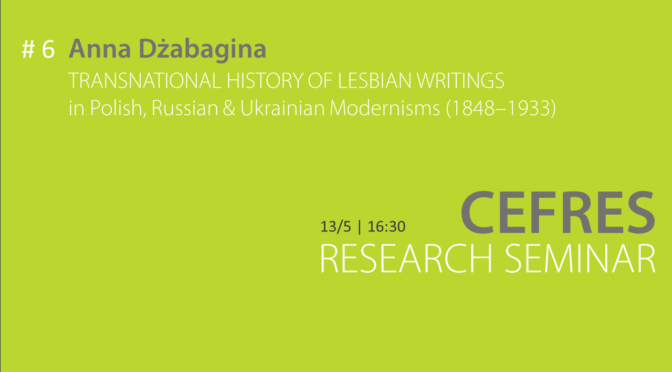Sapphic Empire: Transnational History of Lesbian Writings in Polish, Russian and Ukrainian Modernisms and beyond (1848–1933)
6th session of CEFRES in-house seminar
Through the presentation of works in progress, CEFRES’s Seminar aims at raising and discussing issues about methods, approaches or concepts, in a multidisciplinary spirit, allowing everyone to confront her or his own perspectives with the research presented.
Location: CEFRES Library
Date: Tuesday, May 13, 2024 at 4:30 pm
Language: English
Contact / To register: cefres[@]cefres.cz
Speaker: Anna Dżabagina (CEFRES / Charles University)
Chair: Libuše Heczková, FF UK
Abstract
During the seminar, Anna will present her research on the phenomenon of sapphic modernism – a new literary language to express nonheteronormative experiences, desires, and identities – in works of Central and Eastern European women writers, particularly from Polish, Russian, and Ukrainian literature, in a period tentatively set between the Revolutions of 1848 and the Nazi rise to power. Combining the achievements of global lesbian studies and local queer studies with the perspective of locational feminism and transnational modernist studies, Anna’s research constitutes a pioneering initiative that aims not only to fill the gaps within the histories of Slavic literatures but also to shift a broader understanding of the history of queer writings by joining the process of creating a new paradigm of history of sexuality. Instead of national lenses, she employs a transnational approach to investigate sapphic traces in women’s writings from the territories of the Russian Empire, with all consequences of developing under the same imperial structure (e.g., access to a shared print culture and state regulations).
One of the critical issues of her investigation is the relationship between the expressibility of nonheteronormative experience and the geographical and cultural location of the analyzed writers, who represent three different variants of these „locational coordinates.” That is imperial, hegemonic Russia; Poland, which despite being colonized, already has its rich literary tradition and memory of its imperial past, and Ukraine, which in the period undergoes a dynamic process of formulating its national demands and developing modern national identity, for which the key factors are the language and national literature. Combined, they create a unique comparative field, allowing for questions on the relationships between sexuality, nationality, and expressibility of female same-sex desires in the period when modern cultures and national identities were shaped. Looking into the works of such writers as Narcyza Żmichowska (1819-1876), Olha Kobylianska (1863-1942), Lydia Zinovieva-Annibal (1866-1907), Poliksena Solovyova (1867-1924), Lesia Ukrainka (1871-1913), Lyudmila Vilkina-Minskaya (1873-1920), Sofia Parnok (1885-1933), Aniela Gruszecka (1884-1976), and others, Anna intend to shed light on those mechanisms, and more importantly – to portray a complex, interconnected history of modernist lesbian writings in the region.
See the complete program of 2023–2024 seminar here.

